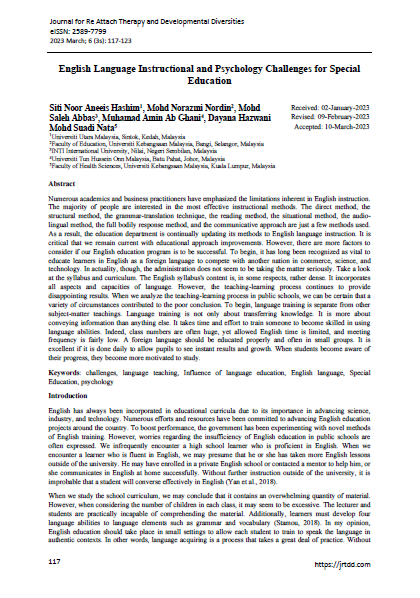English Language Instructional and Psychology Challenges for Special Education
Main Article Content
Abstract
Numerous academics and business practitioners have emphasized the limitations inherent in English instruction. The majority of people are interested in the most effective instructional methods. The direct method, the structural method, the grammar-translation technique, the reading method, the situational method, the audio-lingual method, the full bodily response method, and the communicative approach are just a few methods used. As a result, the education department is continually updating its methods to English language instruction. It is critical that we remain current with educational approach improvements. However, there are more factors to consider if our English education program is to be successful. To begin, it has long been recognized as vital to educate learners in English as a foreign language to compete with another nation in commerce, science, and technology. In actuality, though, the administration does not seem to be taking the matter seriously. Take a look at the syllabus and curriculum. The English syllabus's content is, in some respects, rather dense. It incorporates all aspects and capacities of language. However, the teaching-learning process continues to provide disappointing results. When we analyze the teaching-learning process in public schools, we can be certain that a variety of circumstances contributed to the poor conclusion. To begin, language training is separate from other subject-matter teachings. Language training is not only about transferring knowledge. It is more about conveying information than anything else. It takes time and effort to train someone to become skilled in using language abilities. Indeed, class numbers are often huge, yet allowed English time is limited, and meeting frequency is fairly low. A foreign language should be educated properly and often in small groups. It is excellent if it is done daily to allow pupils to see instant results and growth. When students become aware of their progress, they become more motivated to study.

